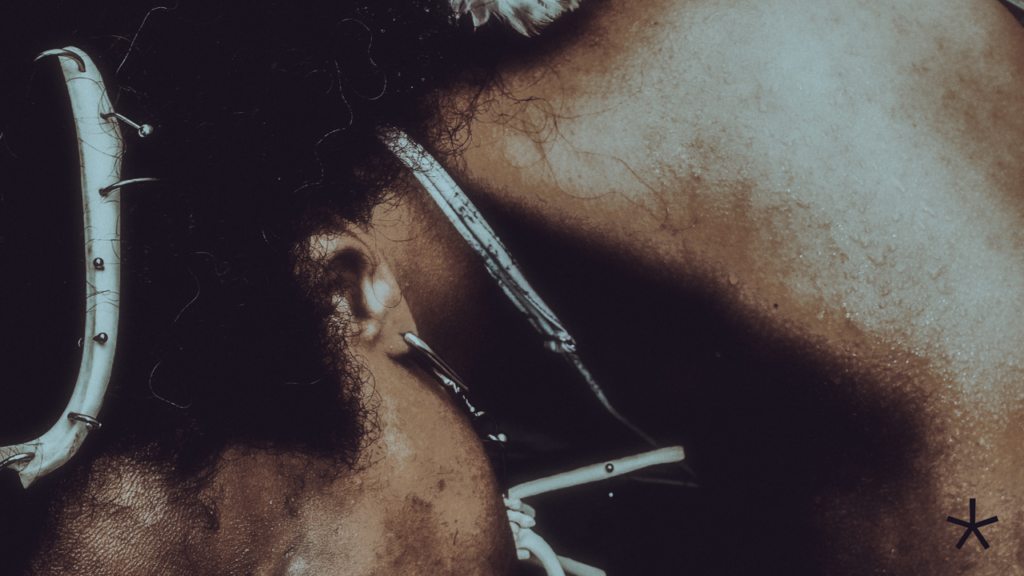
Iceboy Violet found a lifeline in noise. They were 18 years old and making hip-hop beats influenced by Madlib and Dilla—satisfying enough on a formal level, perhaps, but there were deeper, more conflicted emotions that classic boom-bap couldn’t assuage. Their housemate, though, listened to noise music, and the two would sit up until 7 a.m., bathing in the chaos. “It was the only thing that could drown out the voice in my head,” they said. At the same time, they were delving into the sounds of grime, whose chest-puffed rage seemed to mask a deep well of anguish—“all this pain that’s kept hidden by the pressures of hyper-masculinity,” said Iceboy, who is nonbinary, in another interview.
On their debut mixtape, 2018’s wild, bracing MOOK, they brought those two strains of music together—burying Dizzee Rascal samples in cavernous reverb, looping snippets of homophobic MC taunts over concussive waves of bass, and whipping white noise into corrosive whirlwinds. Not until the final track, woven from delicate filaments of drone, did they reveal their own rapping voice: a plaintive snarl, cracked and swollen. “Father, father/Why won’t you unburden me/My chest feels heavy/Can’t breathe,” they pleaded, sounding as though a foreign mass were lodged in their throat.
Since that shot across the bow, Iceboy Violet has continued to shape their voice into a peerless instrument. They contributed a handful of guest features to artists like Loraine James and aya, and on last year’s The Vanity Project mixtape, they explored new cadences and registers over beats by likeminded producers that stirred drill, ambient, grime, and noise into an ominous miasma of melted textures. Not a Dream but a Controlled Explosion is the first project to fully combine Iceboy’s rapping with their own production, and if it is less noisy than MOOK—marginally, anyway—it is no less cathartic, and no less unusual. It’s a major step forward for the artist.
The album opens with a fake-out: a half minute of synth shimmer and crystalline pinging, as gentle and ethereal as Fennesz, before an overdriven, drill-inspired beat breaks through with the force of an earthmover. Blending sensuousness with violence, this is the palette that will carry across the whole record: thundering, distorted 808 kicks; clouds of vaporous tone color; bass frequencies that smolder like a mine fire, sucking all the oxygen out of the mix. “Black Gold” borrows the choral pads of so-called weightless grime and tips them toward chilly, mid-’90s ambient techno; “Refracted” pairs deadweight drums with ghostly wails before trailing off into an a cappella phrase of almost liturgical grace. The production is so enveloping that an instrumental version of the album would not seem to be missing anything at all.
But there’s no missing Iceboy Violet’s voice: Even when their rapping is hard to make out, which is often, they are a commanding presence. Words ride roughshod over the beat, a tumultuous stream of images almost too fast to keep up with. Despite their immediately recognizable tone, they stretch themselves in striking ways: In “Refracted,” their insistent, broken yelp is reminiscent of a hardcore singer’s bark, while in “Ekklipse,” they dip into a gravelly baritone over a scabrous dancehall beat.
Their lyrics unspool in a free-associative stream of assonant rhymes. “Baby we’re survivors/Flowers turned to fertilizer/What’s going on inside ya?” Iceboy riffs on “Black Gold,” trading verses with Florence Sinclair, whose sandpapery drawl here evokes Forest Whitaker’s Ghost Dog character. In “Ekklipse,” they offer a vision with the force of a soothsayer’s premonition: “Idols to false gods lie/Like dogs in the water/Dreams ekklipse the sun/And whistle like mortar.” Songs rarely can be pinned down to a single, clear meaning, but certain themes—religious imagery, the inseparability of longing and shame, repeated instances of shattering and breaking—pile up into a suggestion of ambient desperation, of a self grappling with its own identity.
The most crucial throughline might be the centrality of desire. Iceboy Violet has said that the record is fundamentally about the ways that everyday perception of reality is molded by feelings of want—“daydreaming, hallucination, yearning & cum.” Peer behind the wreckage of the beats, and an unabashedly romantic sensibility is palpable in imagery of bodies tasting and enfolding one another. In “Paris, Bradford,” Iceboy reveals an unexpected tenderness: “Burn after reading/You lead the slow foxtrot into the evening,” they murmur over a pastel swirl of what might be guitar feedback. “Silk threads connect our spines/Lost track of what limbs are mine/I feel everything but fine/I hope I know that you need me.” Beneath the bass’s crushing weight, a lightness stirs: a dizzying blend of spiritual rapture and physical pleasure that refuses to be kept down.
